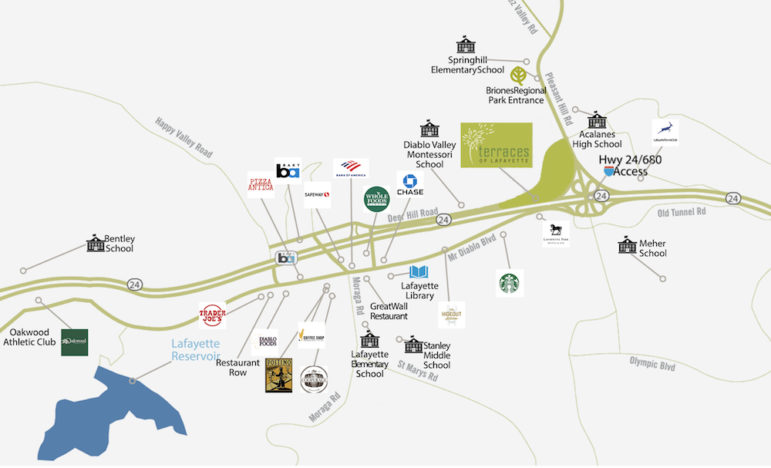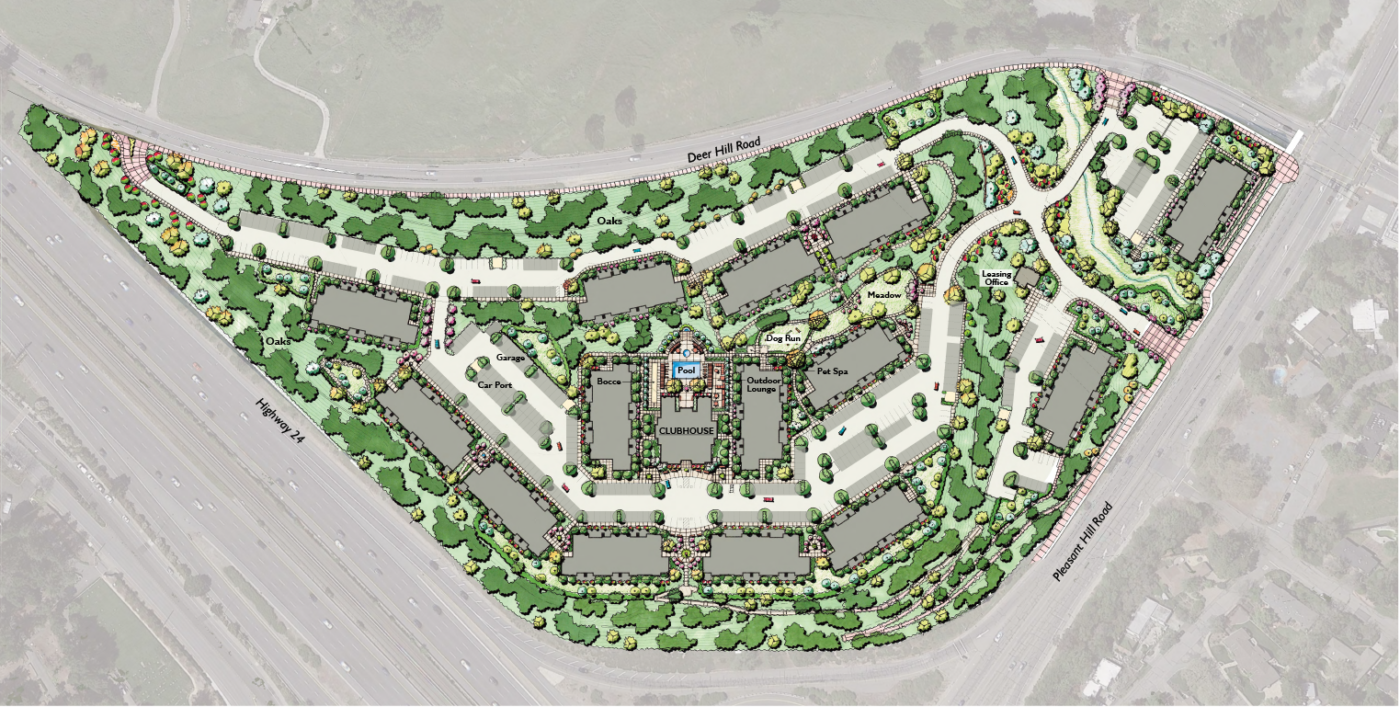After 9 1/2 years of plans and revisions, dozens of contentious public meetings, a ballot measure and threats of lawsuits, the controversial 315-unit Terraces of Lafayette apartment project was approved early Tuesday morning by the Lafayette City Council.
But council members were adamant that developer O’Brien Land Co. work with the city both on traffic-related issues and on a list of other new conditions of approval the council established Monday night.
The council, which had met for 10 hours on the Terraces project two weeks earlier before postponing an approval decision, spent almost eight hours again Monday (and until 12:45 a.m. Tuesday) discussing the project and hearing public comments.
Questions about wildfire safety and dissatisfaction with a commissioned traffic study, specifically centering on evacuation plans in a wildfire or other natural disaster, prompted serious talk early Tuesday morning of postponing a decision yet again, to gather what council members said is information crucial to the project.
The final council vote to approve, however, was 4 to 1. Vice Mayor Susan Candell dissented, saying she couldn’t vote for a project which, she said, “is a high-density project in a high-fire zone” without a better evacuation plan in place. Other council members shared Candell’s concerns, especially about a consultant’s traffic study. But they said they trusted assurances by the chiefs of both the Lafayette Police Department and the Contra Costa County Fire Protection District that traffic generated by the Terraces wouldn’t create major additional problems.
Council members also were concerned about the city being sued for violating the terms of SB 330, the state Housing Accountability Act, by delaying an approval to yet another hearing.
“There certainly are legitimate reasons for the city to be asking for additional information, but (O’Brien) could raise due-process concerns if things were extended,” said Rob Hodil, an outside attorney hired by the city for this project.

The Terraces of Lafayette project will sit on a 22-acre parcel on Deer Hill Road just west of Pleasant Hill Road and north of state Highway 24, near Acalanes High School. Plans are for seven three-story buildings and seven two-story structures.
The 315-unit Terraces of Lafayette project has been a sort of microcosm of the regional debate about how housing is planned and developed.
Project supporters, many from far beyond Lafayette, say this dense residential development, about a mile and a half from the Lafayette BART station, represents the sort of transit-friendly housing called for in regional planning efforts including Plan Bay Area 2050, a long-range plan for the nine-county San Francisco Bay Area.
Opponents, including the local “Save Lafayette” preservation group, said the large development is inconsistent with the city’s semi-rural character. Other critics contended the development would foul traffic near key commute routes, would be in an area vulnerable to vegetation fires and would violate the city’s general plan. One public commenter Monday night called Deer Hill Road a “funnel of death;” and others said Pleasant Hill/Deer Hill intersection is already often in gridlock without a 315-unit apartment building nearby. Candell noted that the Lafayette Tennis Club, less than a half-mile from the prospective Terraces site, burned down in October 2019 in a vegetation fire.
The Terraces of Lafayette has been contentious throughout much of the past decade. Councilman Cameron Burks said, “There’s been a great divide in our town over this project.” Indeed, 30 people spoke during public comment Monday night, evenly divided between project opponents and supporters.
Most opponents spoke about traffic congestion and wildfire danger, while supporters praised the project as much-needed housing that, while most units wouldn’t meet specific “affordable” criteria, would still be cheaper than most residents in affluent Lafayette.
The Terraces of Lafayette project was first proposed, as apartments, in March 2011. It was controversial from the get-go; after initial local opposition, the project’s application was suspended in 2014 in favor of a substantially reworked plan for 44 single-family homes, a dog park, a playing field, a playground and a tot lot. A 2018 ballot measure asked Lafayette residents whether they wanted the 44-home version of the project to be approved. Measure L was defeated, and developer O’Brien Homes then resumed the original application for the 315-apartment version of the project.
At least 20 percent of the project’s 63 units would be for very low, low- and moderate-income households – a number Burks called “spectacular for our city.”
O’Brien Land Co. officials have steadily maintained they would consider suing the city if the project was rejected. Bryan Wenter, an attorney for O’Brien, said the Terraces project meets all the requirements of SB 330, and thus warranted approval.
“This project has the law behind it …. powerfully behind it,” Wenter told the council.
The council heard from others Monday night mentioning lawsuits, too. Sonja Trauss of Oakland, of the group Up for Growth, said her group sues cities that don’t comply with housing law, and supported the project. So too did Mike Dunham of the pro-housing group Peninsula for Everyone.
The council’s decision, he said, would have ripple effects on housing throughout the Bay Area. “I hope you do the right thing,” Dunham told the council.
Before Monday’s night’s open hearing concerning the project approval, the council in closed session was scheduled to discuss that legal threat; Anderson said the council had nothing to report publicly coming out of that closed session. Lafayette Planning Director Greg Wolff said O’Brien is “invested and committed” regarding the Terraces, and added he is confident the developer will follow through on a list of added conditions of product approval the council asked for Monday night.
